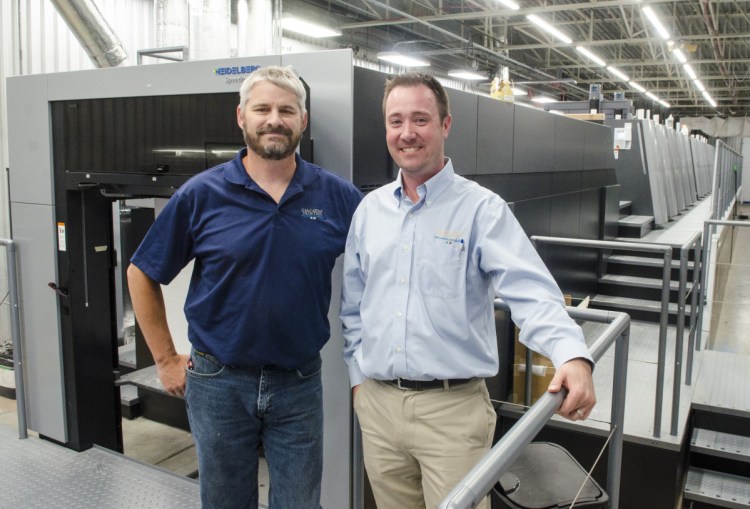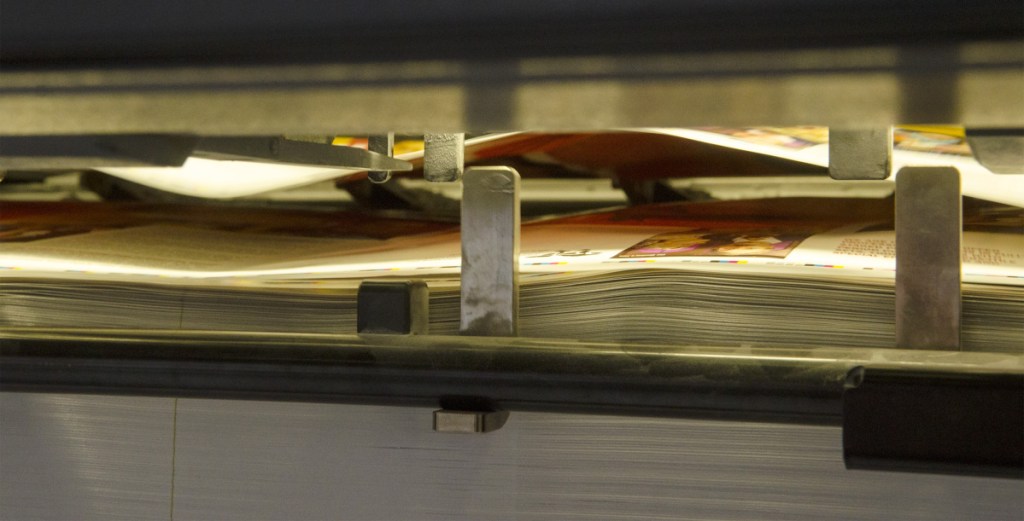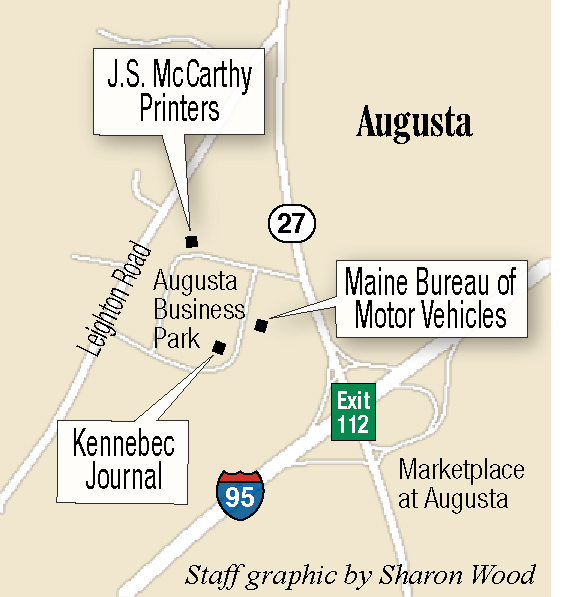AUGUSTA — Nine months and one day after officials at J.S. McCarthy Printers signed the deal to acquire a new Heidelberg press for its printing facility in Augusta, the press was spitting out its first sheets.
While the transition to the new upgraded press was lengthy and logistically difficult in some cases, the payoff, company officials say, is in the increase in productivity that will keep the company efficient and sustainable.
“The technology (is) close to 50 percent more productive than the current press,” company President and Chief Executive Officer Jon Tardiff. “There are very few presses like these in the world.”
The efficiencies of the Heidelberg press touch nearly every step of the printing process, from the time it takes to set up a new print job and load the paper to how the colors are checked in the middle of the run and the printed pages are taken off the press. And because of those changes, the company has been able to cut the waste paper it produces in half, from three trailer trucks a week to one and a half trailer trucks.
That means when customers need materials printed during high-demand times — generally from April to December — J.S. McCarthy has more capacity to take on those jobs.
David Leach, a business lecturer at the University of Maine at Augusta, said the investment in the $6 million project is something that will help a company based in central Maine compete on a broader scale, which offers benefits to the local economy in creating skilled workers and being able to make a product as the pool of available workers shrinks.
“Although our unemployment rate is enviable,” Leach said, “anyone in business understands the difficulty of finding skilled laborers of any age.”
Currently, the unemployment rate is 3 percent.
“We have to offer world-class products like what J.S. McCarthy offers to stay competitive and keep it viable,” Leach said.
From its Augusta printing plant, the company produces a wide range of products from business cards to perfect-bound books. While some clients are as far away as California, the company’s market consists of the northeastern states.
Getting the new Heidelberg press installed in J.S. McCarthy’s Augusta printing facility was not a simple thing, but company officials say it was worthwhile.

Press operator Mark Madsen adjusts the new Heidelberg press from a touch screen monitor on Friday at J.S. McCarthy in Augusta.
The Komori press it replaced was removed and sold to another printer. Preparing for this one required a support system of steel pilings that go down between 50 feet and 55 feet to ledge, and backfilling with concrete.
Because the press hall is not tall enough to accommodate a crane, the pilings were fabricated as they were being driven into the ground at 6-foot to 8-foot lengths.
Michael Tardiff, vice president of marketing at the company, said the construction area was tented off from the rest of the production floor, which continued production.
Jon Tardiff said he and his father Rick, who has since retired, toured the Heidelberg facility in Germany in 2014 and could see the direction that printing technology was going and made the decision to invest.
“One of the problems in our industry is that people haven’t kept up with the times. When you start falling behind, you get to a point where you can’t catch back up. It becomes too much of an investment,” Jon Tardiff said.
The family-owned company’s roots reach back four decades to Letter Systems in Hallowell, when Rick Tardiff sold printing jobs during the day and printed them at night.
Since then, the company has acquired other smaller companies in Maine and New England, including J.S. McCarthy in 2000.
In addition to Jon Tardiff and Michael Tardiff, Matthew Tardiff is the chief financial officer and Amy Tardiff is vice president and general counsel.
In 2016, the company completed its third expansion since 2007, to house machinery that makes sheets of paper from giant paper rolls, bringing the process in-house and under the company’s control.
The investments that J.S. McCarthy makes are not limited to press equipment. The Tardiffs have also invested in a sales training program for its sales staff.
“It’s a year, year-and-half venture, where we’re training constantly on how to sell, how to sell more and how to be a resource,” Jon Tardiff said.
“Just like we’re putting the tools in the pressmen’s hands, we’re giving them the tools they need,” Michael Tardiff said.
“The other side of it is we better service our existing clients with turn-around times,” Jon Tardiff said. “Everybody wants speed-to-market, they want to get it out faster. This new technology allows us to do that.”
Jessica Lowell — 621-5632
Twitter: @JLowellKJ
Send questions/comments to the editors.






Comments are no longer available on this story